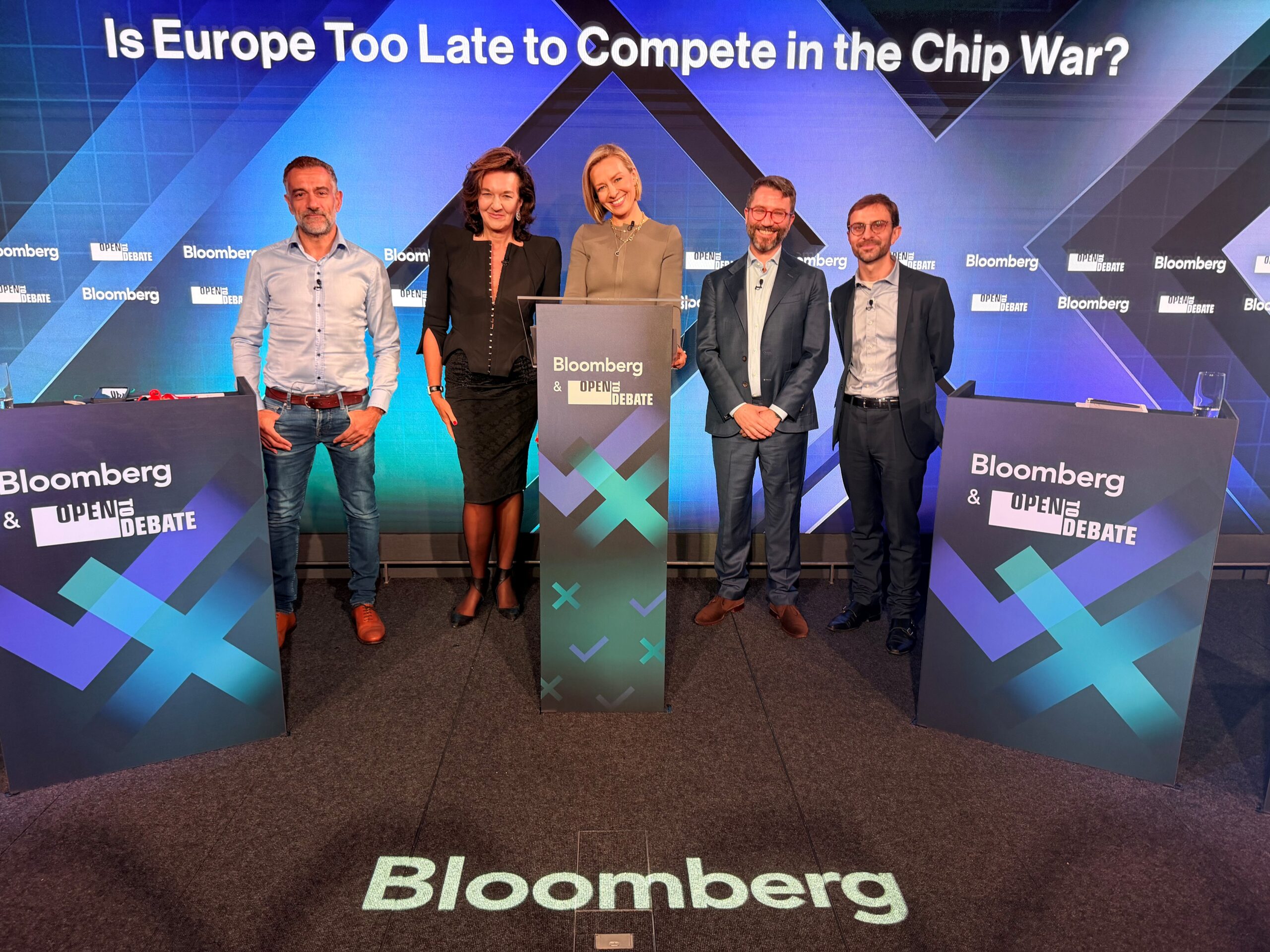NO: Opening Statement at the Bloomberg Tech London 2025 debate, 20 October 2025
The topic of today’s debate is alas a common tech trope – especially from Americans and tech giants: “Europe is too late for X [replace X for any digital domain: hardware software connectivity], you hapless little Europeans let us do it all for you”. In chips the story typically goes: “Today Europe accounts for less than 10% of global semiconductors, it once produced nearly half of the world’s, it has fallen from grace and just cant catch up.”
Indeed the loss of first mover advantage is the story of the European tech industry: we were pioneers, trailblazers, we are now a digital colony. Which is why we have EUROSTACK to reverse this decline.
“IT IS TOO LATE FOR EUROPE TO COMPETE IN THE CHIP WARS”? But what does “COMPETE in the chips wars” mean? Does it mean can we meet our entire chip demand with a wholly domestic value chain? And what chips? What size? Across all applications? Does it mean can we export chips?
The narrative our opponents are pushing is that “catching up” (whatever that means) with “global domination in supply chains” by the US and Asia is entirely elusive for Europe given the disparate size of respective investments (hundreds of billions vs tens at best) – so Europe should then what? Just give up?
This is not realism or pragmatism. It gaslighting of Europe, trying to psyche us out.
Of course there are complicated political economy reasons why Europe, once a pioneer, ended up not playing in the same league as current industry giants – but in a globalised world of free trade it did not matter much, we could all live with Ricardian comparative advantages to drive regional specialisation around one’s strengths.
Then we learned this is vulnerable to trade disruption with COVID. We are now in profoundly transformed geopolitical landscape, with export controls, economic coercion and supply disruptions leading to sharp redirection and reconfiguration to improve resilience – by everyone.
And this is happening just at the time when the technical landscape is massively evolving from legacy larger chips towards smaller cuts and architectures – below 5mn (advanced chips) for ai applications, cars, defence – going ever smaller.

We are in a chips gold rush, especially in fabrication where everyone is taking steps to become more resilient. The global spend in semiconductors in the next decade is estimated at $2-3 trillion, whatever the number turns out to be – Taiwan has the lion’s share incl $100bn in the US; the US itself accounts for over ¼ ($646 bn capex), growing share of fabrication from 10% to 14-15%, Korea investing massively also in memory (HBM), Japan in chips and wafers, and China racing for self sufficiency with giant state incentives to offset export controls, achieving major growth in legacy/mature chips.
In Europe yes, we only have slightly under 10% in share of global fabrication, all in mid and legacy/mature range for sensors, imagers, power/telecom components, microcontrollers for automotive, industry, defence – the stuff we actually demand. We don’t have fabrication below 5nm, because demand has been limited.
But two things:
- We are in a very different imperative today – with very changed perception of the sovereignty and security risk, just at the time when demand for advanced chips is expected to grow strongly because of (a) cars – as we shift to clean mobility (EVs), software-enabled cars, assisted/autonomous driving cars, (b) AI (c) defence. Cars are an imperative for Europe: we will support our car industry, which accounts for €1tr in GDP and employs 13 million Europeans, come what may. AI is an imperative. Defence is an imperative. We are not going to stand still.
- Europe already has superpowers in critical parts of value chain/chokepoints:
- Europe is super strong in chip design, which determines today’s critical trade off between speed, power and temperature that in turns drives development costs. We have multiple design heroes supporting an ecosystem of flexible fabless companies, need I mention ARM in the UK, and multiple Research and Technology Organizations that go from early stage research to pre-industrialisation – French/Italian CEA-LETI in Grenoble, Belgian Imec, German Fraunhofer, Finnish VTT…
- Enters the king: Europe’s ASML has a global monopoly in advanced photolithography machines of incredible complexity, on which the whole world depends to produce the smallest chips at scale. It also has a powerful ecosystem of European partners like German Zeiss for mirrors, Belgian Imec, and plans to pump up ecosystem in Eindhoven, Netherlands (Project Beethoven). China and the US are nowhere near in this part of the value chain. It has huge strategic significance, there is no alternative on horizon – it is a “natural monopoly” super difficult to challenge because it comes from “hardware matching” – i.e. the benefit in yield and ROI to running one scanner vendor (which is why Nikon’s machines aren’t making it).
But also, fabrication in Europe is not going to stand still. Spend will more than double to 2032 and will at least preserve Europe’s 7-8-9% share of global foundry capacity – not just in the mid range but including plans for advanced nodes:
- Most likely scenario: expansion of the facility in Dresden below 5nm, through consortium involving Globalfoundries, Bosch, Infineon, NXP and TSMC, a planned investment of €10-15bn, could start production of 3nm nodes in 2027
- Also discussions to create a European Boutique Fab for sub-2nm and A-size nodes. Initial investment €20bn, 20bn public/private consortium, idea is to strategically leverage research institutions (Imec, CEA-LETI, Fraunhofer) and equipment suppliers (ASML, Zeiss), timeline 2030.
We absolutely can and will stay in the game for Europe
In conclusion: we are being gaslit with the trope that “Europe cannot compete”. When globalisation was a collective drug, we were fine with chips as a global industry with regional specialisations. We are now reacting to a new geopolitical reality of hard power and trade wars where we’ve all suddenly woken up to the need for self reliance. It does not happen overnight and there are still strong interdependencies criss-crossing the globe.
But the point is Europe has tremendous capabilities and assets and know how. Europe is a superpower in selected but essential parts of the supply chain the world needs too. This does not mean it needs to just “specialise”. Europe is not going to let its car industry fall over: cars are not negotiable for Europe. Europe needs a defence, and AI is also not negotiable. It is a dangerous time and an uncertain time but the direction is clear and we can reduce our dependencies, become more sovereign and muscle up along the way – absolutely.



